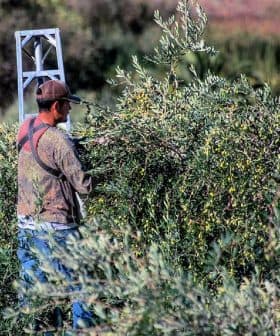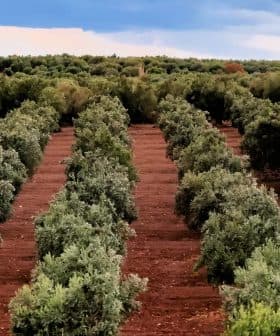California Approves Olive Oil Standards
California olive oil producers are celebrating the approval of stricter labeling and grading standards for olive oil, which will take effect in September and apply to about 100 growers and a dozen mills in the state. The new regulations aim to differentiate locally-produced olive oil from imported varieties, which are often considered substandard, with the ultimate goal of applying stricter standards to imports as well.
California olive oil producers are cheering as the state approved stricter standards on the labeling and grading of olive oil Thursday.
The rules will go into effect on September 26 for California producers with output of at least 5,000 gallons per year, which applies to an estimated 100 growers and about a dozen mills.
California producers, who supply approximately two percent of the American olive oil needs, have been vocal proponents of the new regulations, seeking to differentiate their products from imported olive oils which they say are often substandard. And while the new rules only affect olive oil produced in California, industry observers say the ultimate aim is to have stricter standards apply to imports as well.
The approval of the standards marks a victory for the fledgling California olive oil industry, which hopes that new testing and labeling requirements will provide a boost for locally-produced olive oil, while chipping away at the market advantages long held by imports from Spain, Italy and Tunisia.
The Olive Oil Commission of California (OOCC), made up of olive growers and millers from across the state, submitted a set of proposed standards to the California Department of Food and Agriculture (CDFA) earlier this year. On July 15, the department held a hearing to record testimony and evidence from olive oil handlers, olive growers and the general public on the proposed Grade and Labeling Standards for Olive oil, Refined-Olive Oil and Olive-Pomace Oil.

After spending the summer analyzing the information collected during the hearing, the department decided to implement the proposed standards, with just a few exceptions.
“The California olive industry will now be able to distinguish itself as the authentic, premium-quality, extra virgin olive oil producer to American consumers,” Jeff Columbini, chair of the OOCC said in a release. “Consumers will now be able to know that when they are purchasing and consuming California extra virgin olive oil, it truly is 100 percent extra virgin olive oil.”
The new standards include more precise methods for testing adulteration, known as PPP and DAGs, and the banning of misleading marketing terms for refined oils such as “light” and “pure.” The benchmark for free fatty acidity (FFA) is set to 0.5 percent, below the international standard of 0.8 percent.
The only proposed standards that failed to make the cut were purity parameters that were less strict than those already in place in the California Health and Safety Code, and another that attempted to regulate the labeling of food ingredients.
The proposal suggested that when olive oil is used as an ingredient in prepared food, the label must specify the grade used. However, that type of regulation was found to be beyond the scope of the standards as well as beyond the authority of the California Marketing Act.
Extra virgin olive oil is defined as “olive oil that has a free acidity, expressed as free oleic acid, of not more than 0.5 grams per 100 grams, a median of defects equal to 0, and the other characteristics which correspond to the limits fixed for this grade in these standards. Extra virgin olive oil is fit for consumption without further processing.”
The standards explicitly define three grades of olive oil, two grades of refined-olive oil, and three grades of olive-pomace oil.
State senator Lois Wolk (D‑Davis), chair of the Senate Agriculture Subcommittee on Olive Oil Production and Emerging Products, said she was pleased with the department’s decision to move forward with the standards.
“Today’s decision is not only good for consumers, but also helps strengthen the competitiveness of California’s olive oil industry,” she said in a release.
Wolk authored the legislation establishing the commission that studied the proposed standards.









